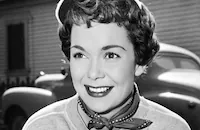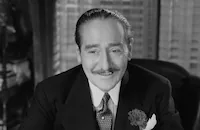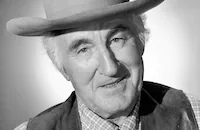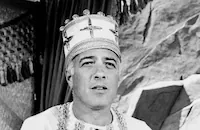Pollyanna

Brief Synopsis
Cast & Crew
David Swift
Hayley Mills
Jane Wyman
Richard Egan
Karl Malden
Nancy Olson
Film Details
Technical Specs

Synopsis
In the small town of Harrington during 1912, twelve-year-old, recently orphaned Pollyanna Whittier comes to live with her aunt, Polly Harrington, whose ancestors founded the town. Polly is kind but runs both her house and the town with an austere rigidity, and when Pollyanna arrives, in the hand-me-down clothes from her parents' missionary station in the British West Indies, her aunt dismisses her to an attic room. Although the servants, assistant Nancy Furman, cook Tillie Lagerlof and maid Angelica, treat the girl with similar brusqueness, Pollyanna utilizes what her father termed "the gladness game" to find a positive aspect even in her lonely new life, and enjoys the majesty of the house and grounds. At dinner, Pollyanna tries hard to please Polly, but cannot help spilling her milk and shocking Polly with her frank assessments of the family's wealth. Polly first forbids Nancy to see her beau, George Dodds, then cautions Pollyanna to act with the highest propriety in order to represent well the Harrington family. After Pollyanna throws her arms around her aunt to say goodnight, however, Polly warms to her and declares that Pollyanna must have a new wardrobe. The next day, Polly buys the girl outfit after outfit, then leaves Pollyanna in town under Nancy's care. When George approaches them, Nancy pretends the amorous young man is her cousin "Fred," and the three share ice cream. Later, Pollyanna unnerves Nancy by admitting that she knows "Fred" is George, but when Polly scolds them for returning late, Pollyanna earns Nancy's gratitude by taking the blame for their tardiness. Meanwhile, a burst water pipe at the old Harrington House, now the town orphanage, has attracted the attention of Polly, Mayor Karl Warren and Polly's former boyfriend, Dr. Edmund Chilton, who is back in town after a five-year absence. Polly has called a town meeting at her home to deal with the situation, and although Pollyanna is sent upstairs, she hides in a large plant to listen. Ed, who is trying to stay out of the town's business, sees the girl and feeds her snacks through the foliage while Karl tries to convince the town that the overcrowded, dilapidated orphanage must be rebuilt. Polly, however, is adamant that her family home be preserved, and the townspeople are too frightened of her influence to disagree. After Karl leaves in a fury, Pollyanna retreats to the kitchen, where Angie is critical of Pollyanna's unfailing cheerfulness, but Nancy and Tillie stick up for the girl, and warn her that the coming Sunday will be difficult to bear. On Sunday, everyone attends church, where Rev. Paul Ford delivers the sermons that Polly prepares for him, preaching of God's dark wrath and the dire consequences of sin. Afterward, when Polly's staff complain about the sermon, Pollyanna explains the glad game and points out how nice it is that the next Sunday is six days away. In town soon after, Pollyanna passes the orphanage, where she sees young Jimmy Bean escape down a tree. Although she scolds him, she joins him at the fishing hole, and when she spots Ed there, subtly relates that Polly will be home alone all day. Later, Jimmy takes Pollyanna to explore the dilapidated manor of crotchety Mr. Pendergast. When Mr. Pendergast catches Jimmy, Pollyanna chases after them to rescue her friend, and soon convinces the old man not to call the constable. Although he pretends to be cruel, Mr. Pendergast is actually lonely and kind, and when Pollyanna admires a rainbow reflected onto the wall through a glass prism, he explains the principles of light to her. Meanwhile, Ed visits Polly and tries to speak frankly about his continuing love for her, but she changes the subject and soon the two are arguing. The next day, Polly sends Nancy and Pollyanna to town with charity baskets, and when it soon becomes clear to the girl that the recipients find the baskets patronizing, she presents each basket as a gift from one friend to another. The last stop is to Mrs. Snow, a cranky shut-in who considers herself an invalid. Although Nancy and Mrs. Snow's daughter, Mildred, are terrified of the older woman, Pollyanna soon charms Mrs. Snow by stringing up prisms to throw rainbows on her wall. At the same time, Karl and Ed are organizing a fund-raising bazaar for a new orphanage. An enthusiastic Pollyanna brings Jimmy to visit Mr. Pendergast, who is secretly thrilled to see them, and convinces the old man to sell "rainbow maker" prisms at the bazaar. She then asks Mrs. Snow to make a quilt, but the shut-in is busy choosing her own coffin liner. Although Pollyanna tells Mrs. Snow how she once asked the mission for a doll but got crutches by mistake, emphasizing how she managed to feel glad that she did not need crutches, Mrs. Snow remains ill-humored, prompting Pollyanna to leave in frustration. Soon, Polly hears that Nancy and Pollyanna are involved with the bazaar, and forbids them to continue. Karl and Ed then learn that many townspeople are too frightened of Polly's authority to attend the bazaar, so Ed confronts Polly at her house to ask for her cooperation. Polly remains cool and suspicious, but after Ed accuses her of having "no love to give," she cries in secret. Outside, Ed, George and Nancy commiserate, and after hearing Pollyanna comment that "no one can own the church," go to Paul to enlist his support. Paul, however, is also too frightened to stand up to Polly. Later, Pollyanna visits Paul as he practices his sermon, and inspires him by relating her father's own struggles with reaching his flock and his eventual reliance on Abraham Lincoln's statement that "When you look for the bad in mankind expecting to find it, you surely will." The next Sunday, Paul apologizes to the congregation and preaches joy instead of doom, after which he urges everyone to go to the bazaar. Although Polly is horrified, the town is galvanized, and that night, the bazaar is a huge success. Pollyanna has been forbidden to attend, but Jimmy climbs the tree outside her window and persuades her to sneak out with him. At the bazaar, a suddenly healthy Mrs. Snow has arrived with her finished quilt and secretly arranges for Pollyanna to win a doll. Hours later, Pollyanna clutches the beloved doll as she climbs back up the tree, but at the top, she loses her balance and crashes to the ground. Ed soon diagnoses her with partial paralysis, stunning the household, which gathers around Pollyanna's bed, hoping to cheer her up. When Paul visits, a devastated Polly questions how God could allow such suffering, but Paul reminds her that they all should be grateful to God for sending Pollyanna, who has touched the whole town with her optimism. Ed tells Polly that, although they can attempt to operate on her legs, Pollyanna's own attitude will most affect her recovery. Polly, who blames herself for the accident, tells Pollyanna she loves her, but the girl remains distraught and refuses to play the glad game. In private, Polly begs Ed for another chance, and they hope that together they can give Pollyanna enough love to recuperate. Suddenly, the gardener rushes in with the news that people are trampling the flowerbeds. When Polly opens the front door, she sees the entire town approaching, each person carrying a gift for Pollyanna. Ed carries the reluctant girl downstairs, where one by one the townspeople each wish her health. Mrs. Snow leads the group, advocating positive thoughts, while Mr. Pendergast announces that he has adopted Jimmy, and Nancy shows Pollyanna her new engagement ring from George. After Paul points out that they looked for the good in people and found it, Pollyanna, beaming, turns to her aunt, who embraces her. Later, as Polly and Ed take her by train to the hospital, Pollyanna watches joyfully from the window while the townspeople erect the slogan "The Glad Town" under the Harrington railroad sign.

Director

David Swift
Cast

Hayley Mills

Jane Wyman

Richard Egan

Karl Malden

Nancy Olson

Adolphe Menjou

Donald Crisp

Agnes Moorehead
Kevin Corcoran
James Drury

Reta Shaw

Leora Dana
Anne Seymour

Edward Platt
Mary Grace Canfield
Jenny Egan

Gage Clarke

Ian Wolfe
Nolan Leary
Edgar Dearing
Crew
Katherine Lee Bates
Joseph Behm
Gertrude Casey
Leon Charles
Carroll Clark
Robert Clatworthy
Robert O. Cook
Don Da Gradi
Walt Disney
Peter Ellenshaw
Gil George
George Golitzen
Frank Gross
Russell Harlan
Ub Iwerks
Chuck Keehne
Evelyn Kennedy
Emile Kuri
Fred Maclean
Franklyn Marks
Pat Mcnalley
Walter Plunkett
Ruth Sandifer
Paul Smith
Paul Smith
Mac St. Johns
David Swift
David Swift
Dean Thomas
Samuel Augustus Ward

Photo Collections
Videos
Movie Clip




Film Details
Technical Specs

Articles
Pollyanna
Disney had made his name and fortune creating animated films but by 1960 he had shifted his focus to family-oriented live-action movies. Porter's novel was almost fifty years old and had been shot before as a silent film in 1920 starring Mary Pickford when Disney decided to film it. The story was already dated and the problem for Disney was finding a child actress who could play Pollyanna a guileless, optimistic girl without becoming saccharine. Patty Duke had auditioned unsuccessfully for the part and production was almost called off. By chance Disney's wife was visiting London and while out shopping with the wife of studio head Bill Anderson, happened to catch Hayley Mills' film debut Tiger Bay (1959). The two women lobbied their husbands to cast Mills and Disney was sent a print of Tiger Bay to view. Despite objections from David Swift (who Disney had chosen to direct Pollyanna), Mills got the part.
Filming took place from July to October 1959 in several California locations Santa Rosa, Napa Valley, and Petaluma, as well as on the Disney lot in Burbank, with the cast rounded out with Jane Wyman, Agnes Moorehead and Karl Malden, who played the Reverend Snow. In his autobiography he wrote "Pollyanna marked several firsts for me. It was the first time I worked for Disney, my first picture coming out of my Warner's contract, and the first time that I made a deal for the picture as a whole instead of getting a weekly salary. [...] The audience was to be introduced to my character, the Revered Snow, through his first sermon, several pages of chandelier-rattling fire and brimstone designed to put the fear of God into a church full of New England parishioners. It was that speech I couldn't wait to sink my teeth into when I first read the script. I decided to pattern the delivery after a Serbian priest I had known in Gary [Indiana], and, keeping him in mind, I spent a couple of months working on the speech every morning up in my little study, often waking up the girls by shouting at the top of my lungs. By the time I was ready to shoot the speech, Mila and Carla were letter perfect on it as well. To this day Mila remembers it better than I do.[...] The day after I shot my long sermon, Walt [Disney] made a point of seeking me out to tell me he had just seen the rushes and how happy he was with them. He even sent me a sixteen-millimeter print of the speech. He made working at the studio that bore his name a total pleasure. "
Malden was equally happy with his co-star Mills, inviting her to his house to play with his young daughters, "Hayley was about to become a star, but she was totally unaffected, a little girl just like my daughters, dashing through the yard trying to get 'home' before she was tagged. I think that quality came across on the screen and helped to make her so appealing. Like Natalie Wood, Hayley was a young actress whose performance never veered into the precious or self-conscious. You believed her one hundred percent; she was never condescending toward her own childhood, a trap so many young actors fall into.
"She also had the good grace to be nervous. If I remember correctly, Hayley's first day of shooting was in a scene with me. [...] We rehearsed the scene a couple of times and I was trying to warm up things up so much that I could feel the scene turning to mush. I was trying to figure out what to do when we broke for a few minutes. I looked at her adorable little face and said, "You know, Hayley, yours is a lot smaller, of course, but your nose is just like mine." She burst out laughing. Whenever I felt her tensing up, I'd just point back and forth between her nose and my own. We were friends from then on."
Mills also worked well with Jane Wyman, who played her Aunt Polly. "I was new at film acting then" Mills recalled, "and she was wonderful to me, so patient and kind. I feel that my good reception in that film was in great part due to her. She was wonderful to play off and to, and I found my own standards rising to meet hers. She was a no-nonsense lady. Oh, she could be lots of fun when time came to relax, but on the set, with the urgent business at hand of making a scene pay off, she led one a merry chase. I am grateful to have known her."
Neal Gabler, in his biography of Disney, wrote that "Walt broke down in tears watching Pollyanna in the sweatbox. Swift, who made the film, said he personally 'hated it," but when he told Walt that they would have to cut twenty minutes out of the picture because it was running long, Walt protested, "No, no, no, don't touch it!". By the time production was over, Disney had spent $3.2 million dollars on the film, which only grossed $3.75 million barely making back its costs. Disney blamed the film's title, "Because of the title, we had the women and the children, but the men stayed away." At its release in May 1960, the critics raved about Mills. Newsweek wrote "Part of its success can be attributed to a fine cast that does exact justice to a collection of assorted colorful characters. Its most remarkable member is 13-year-old Hayley Mills, who imbues Pollyanna herself with so much quiet curiosity and enjoyment that her unshatterable optimism seems delightfully plausible." Time was much less charitable: "Disney [...] photographed the little horror in throbbing colors, bloated it with big names...and generally calculated its gasps and sniffles, homilies and heehaws with such shrewdness that Pollyanna emerges on the wide screen as the best live-actor movie Disney has ever made: A Niagara of drivel and masterpiece of smarm."
Pollyanna may have divided audiences over whether it was a heart-warming family film or a sappy melodrama, but for Hayley Mills, it was a star-maker.
by Lorraine LoBianco
SOURCES:
Walt Disney: The Triumph of the American Imagination by Neal Gabler
The Animated Man: A Life of Walt Disney by Michael Barrier
When Do I Start? by Karl Malden
Jane Wyman: The Actress and The Woman by Lawrence J. Quirk
Agnes Moorehead: A Bio-Bibliography by Lynn Kean
The Internet Movie Database

Pollyanna
Quotes
Trivia
Adolphe Menjou's last film.
Hayley Mills' first filmed scene was with Karl Malden: Reverend Ford is practicing his sermon in an open field. Distracted and losing her concentration, Mills hadn't got anything "in the can" by the time cast and crew broke for lunch. Her father, the actor, 'John Mills' , took her aside to ask what was wrong. "Do you know what you are like?" he said. "You are like a great big white cabbage! Yes, really boring. Go on, pull your finger out." The afternoon's shooting went fine, but it was a long hot day "and Karl, I remember, got awfully sunburned. I always felt rather responsible."
Roy Disney, studio business head and brother to Walt, issued thousands of "Pollyanna Photo Locket Necklaces" as a promotional item containing the famous quote attributed to Lincoln in the movie. Discovering the necklace in a gift shop while on vacation with his family, director/screenwriter David Swift called the studio to have the item recalled immediately. Lincoln never said, "When you look for the bad in mankind expecting to find it, you surely will." Swift had simply made it up.
Director/screenwriter Swift had wanted to trim the overlong film by about 20 minutes and rearrange some scenes (most notably the acquisition of the doll in the town bazaar sequence) but Disney, who fell in love with the film by watching the dailies, would not allow it and Swift did not have final cut privileges.
The fireman shown shooing the small boy off a ladder after the a boiler accident at the Harrington House Orphanage.
Notes
The working title of this film was The Glad Game. David Swift's onscreen credit reads: "Written for the screen and directed by." Although Hayley Mills is listed last in the closing credits, her name appears after Kevin Corcoran's in the opening credits. According to a February 16, 1959 Publishers Weekly news item, Walt Disney purchased the screen rights to Eleanor H. Porter's best-selling novel Pollyanna and its sequel, Pollyanna Grows Up, in order to make a film based on both stories. However, the final film was based only on the first book. Prior to its publication in book form, Pollyanna was serialized in Christian Herald Magazine in 1912. As noted in an August 1959 New York Times article, the film's story was close to its source, but changed the manner in which "Pollyanna" breaks her legs, and "simmered her cheerfulness down."
Thirteen-year-old Hayley Mills, the daughter of actor John Mills, made her American feature film debut in Pollyanna. She had earlier appeared in the British film Tiger Bay. She went on to star in such classic films as Disney's The Parent Trap (1961, also directed by Swift) and the 1966 Columbia release The Trouble with Angels (directed by Ida Lupino; for both, see AFI Catalog of Feature Films, 1961-70). Accounts vary slightly as to how Disney cast Mills in Pollyana. He chose her for the role after casting her father for a role in Swiss Family Robinson (see below), and a August 30, 1959 New York Times article stated that, while watching Tiger Bay to assess John's performance, the producer was impressed by the girl's performance in the same film; studio press materials, however, claimed that Disney first considered Hayley after meeting her in person with her family at Disneyland.
Press materials add the following information: The film was shot mostly on location in Santa Rosa and Napa, CA. Locations included the St. Helena railroad station, the Napa River, Stag's Leap winery, Luer Ranch and the Egan Ranch, owned by the uncle of Richard Egan, who played "Dr. Edmund Chilton" in the film. "Aunt Polly's" house, now called Mabelton House, belonged to Mrs. Juilliard McDonald, a member of the famed Juilliard musical family. The crew planted the tree that Pollyanna climbs in the already tree-filled McDonald yard, so that it could then be moved to the studio sound stage for matching shots. Hundreds of local extras were used for crowd scenes, and the production augmented the then-drought-stricken Napa River with 20,000 gallons of water, which were later used to irrigate a local alfalfa ranch.
A August 24, 1959 Hollywood Reporter news item states that the crew shot for two days at the Warner Ranch before returning to Disney's Burbank studio. There, according to press materials, the Aunt Polly set, measuring 110 x 90 feet, consisted of six full rooms that were interconnected in order to allow the cameramen to move continuously from one room to another without having to stop shooting. Although Time listed the film's final budget at $3.2 million, modern sources estimate it at $2.5 million. The film marked Swift's writing and directing debut.
Upon its release, the film garnered glowing reviews. The Variety review stated that "Miss Mills seems headed toward a great career." The Hollywood Reporter reviewer commented that the film "should precipitate a wholesale desertion of that box in the living room, if the addicts haven't lost their means of locomotion," and called Mills an "exceptional talent." For this role, Mills was awarded a special 1960 Academy Award for the Most Outstanding Juvenile Performance, marking the the last time the special award was given. Pollyanna won the Federation of Motion Picture Councils' award for the Best Family Picture of 1960.
A previous version of Porter's novel had been filmed in 1920 by United Artists, entitled Pollyanna, directed by Paul Powell and starring Mary Pickford (see AFI Catalog of Feature Films, 1911-20). The Disney version aired on the Walt Disney Presents television show in three parts on 1, 8 and December 15, 1963.

Miscellaneous Notes
Released in United States Summer July 1960
Released in USA on video as part of Walt Disney's Family Film Collection.
Released in USA on video.
Released in United States Summer July 1960













